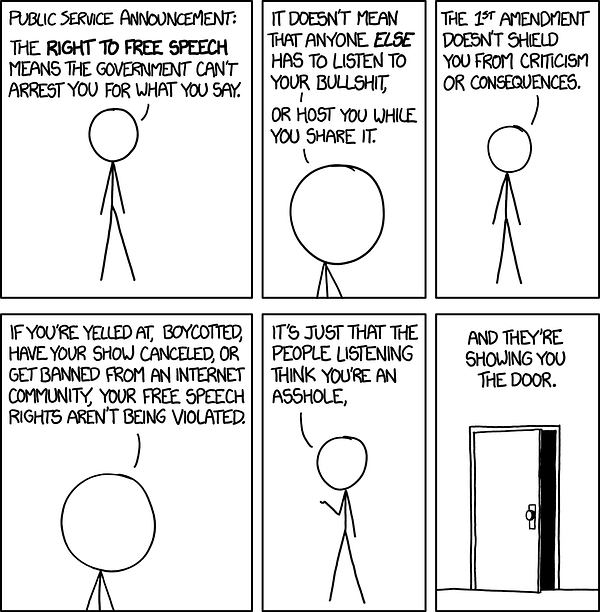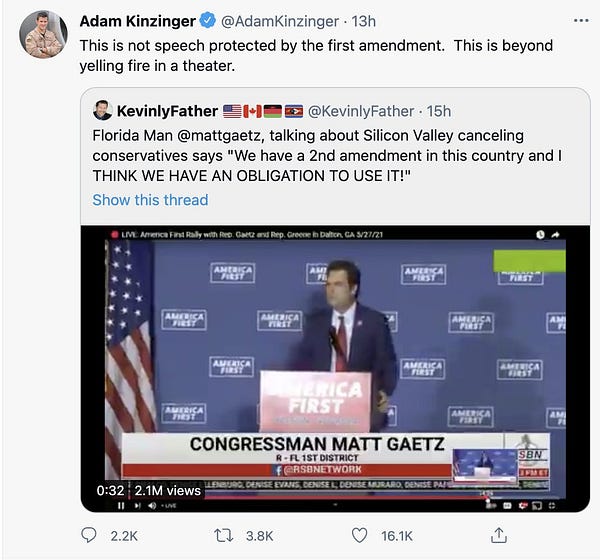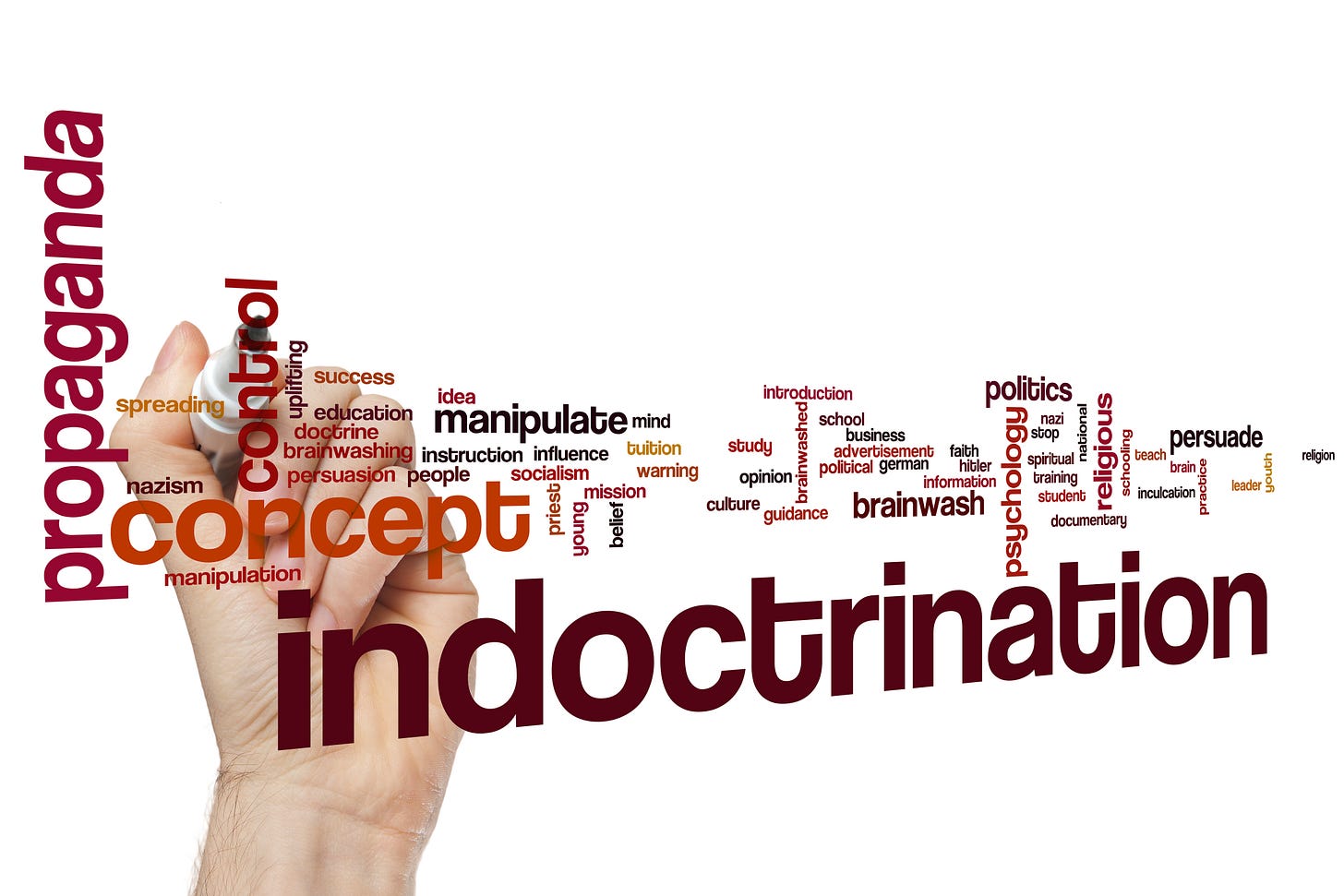E-Pluribus | May 28, 2021
Indoctrination as intervention, politics over science, and rights take over politics.
A round up of the latest and best writing and musings on the rise of illiberalism in the public discourse:
Max Eden: Indoctrination As Intervention
The battle over Critical Race Theory (CRT) is currently perhaps one of the most prominent fronts in the culture war. Some states are in the process of literally banning it in their schools even as some opponents of CRT are arguing against outright bans as unwise and likely unconstitutional. Max Eden of the American Enterprise Institute spells out some of the Biden administration’s attempts to incorporate CRT and similar ideological educational concepts into COVID-relief funding packages.
The American Rescue Plan (ARP) requires school districts to reserve 20 percent of funds for “evidence-based” interventions that “respond to students’ academic, social, and emotional needs”—a very sensible charge. But the devil is in the definition, and the administration’s guidance booklet for spending ARP funds suggests that students’ social and emotional needs include the disruption of “whiteness” and the propagation of Critical Race Theory (CRT) ideology. The “Roadmap to Reopening Safely and Meeting All Students’ Needs” explains that “schools are microcosms of society,” and that therefore “intentional conversations related to race and social emotional learning . . . are the foundation for participating in a democracy and should be anchor tenets in building a schoolwide system of educational opportunity.”
[…]
While parents are still waking up to the reality that Biden’s Department of Education wants to indoctrinate their children, no close observer should be surprised. After all, when Secretary of Education Miguel Cardona served as commissioner of education in Connecticut, he insisted that “we need teachers behind this wave of our curriculum becoming ‘woke.’” When Deputy Secretary of Education Cindy Marten led the San Diego Unified School District, she oversaw teacher training that accused white teachers of “spirit murdering” black students.
The question now is how politicians will respond. There’s little doubt that if the Trump administration published guidance recommending that schools dismantle “blackness” and target black teachers for therapeutic intervention, Democrats would have rightly decried it as a manifestation of “white supremacy.” But to date, Democratic politicians have not raised many qualms about CRT indoctrination in schools.
Read the whole thing.
Joel Zinberg: Following the Politics, Not the Science
In keeping with a recent theme here at Pluribus, Joel Zinberg points out how the COVID-19 lab leak theory, which would seem to be a clear matter of facts and science, has been politicized by, of all people, journalists.
Journalists, on the other hand, seemed intent on countering an anti-China, anti-WHO narrative advanced by President Trump and other conservatives. New York Times reporter Apoorva Mandavilli, for instance, recently tweeted (and later deleted) her hope that people would “stop talking” about the lab-leak hypothesis, on account of its “racist roots.” The scientists’ opinions in the early days of the pandemic gave such journalists cover to indulge in their usual Trump-bashing and assert that they were only “following the science,” in contrast to Trump’s allegedly baser motivations.
We’ve seen this pattern play out time and again over the past year. From the value of lockdowns and masks to the likelihood of speedy and safe vaccine development, scientists and experts based their opinions more on intuition than on facts—until the facts finally forced a reversal. And journalists seemed remarkably incurious about those expert opinions, especially when they presented them with an opportunity to criticize conservatives. Both groups, who have frequently decried official “misinformation,” ought to look first to their own failings.
Read it all.
Kelefa Sanneh: From Guns to Gay Marriage, How Did Rights Take Over Politics?
A new book by Jamal Greene examines America’s (in his words) “obsession” with rights and how deeply that impacts the political environment. Kelefa Sanneh writes at The New Yorker about the desire to dominate and win on so many fronts overshadows the necessity of compromise that enables a pluralistic society to function in a way that benefits all.
Greene views the “rights explosion” as an engine of political division, but it is not clear that American politics was significantly less divisive before it or would be less divisive without it. On its own terms, certainly, this explosion has been a grand success. Speech rights, religious rights, gun rights, and privacy rights have all been expanded and defended; it is hard to argue that any previous generation enjoyed broader rights than we enjoy today. Somehow, this state of affairs has left us feeling “fractured,” as Greene puts it, and dissatisfied. Why?
One answer is that the American way of adjudicating rights is inherently tantalizing: full vindication—a court decision that would radically limit the right to abortion, or the right to own a gun—is always within sight, though rarely within reach. Even the N.R.A., having almost always prevailed in its argument that gun ownership deserves broad protection, has largely declined to celebrate such victories, concentrating instead on the possibility that some of these hard-won rights could be taken away. Greene would argue that our system is built to generate high-stakes court fights, which keep everyone anxious. In the years after the “privacy” cases, some liberals grew accustomed to thinking of the Supreme Court as an ally, often (though certainly not always) defending unpopular rights against legislators and local officials eager to violate them. But liberals are now less likely to think of themselves as members of a minority than they were when Lani Guinier wrote her defense of minority rights, perhaps because of a sense that demographic change is turning racial minorities into a national majority. At the dawn of the nineteen-nineties, Democrats had lost three straight Presidential elections, and the Supreme Court was perceived as liberal-leaning. Nowadays, Democrats have won the popular vote in seven of the past eight Presidential elections, and the Supreme Court, where Trump and Bush appointees predominate, is conservative-leaning. It is probably no coincidence that there seems to be, on the left, a newfound appreciation for the power of democracy, and a newfound skepticism of judges—“unelected judges,” as Greene sometimes calls them, borrowing a term that conservatives once liked to use, when they were fighting what they called “judicial activism.”
Observing these reversals, one can see that what Greene calls “rightsism” is less a philosophy than a strategy, by which a minority cause can achieve a fuller political victory than might otherwise be possible. Structural and cultural shifts have convinced many on the left that their causes are broadly and increasingly popular, and that strong rights protections have become a political obstacle. But it is rash, especially in a big and insubordinate country like this one, to imagine that appeals to reasonableness and popularity will always serve as a more reliable guide to justice than the language of the Constitution…
Read it all here.
Around Twitter
A long thread from Greg Lukianoff of the Foundation for Individual Rights in Education (first five are here; click through for the rest):







Glenn Greenwald on extreme speech and proposed extreme remedies to extreme speech:



Hyperbole is alive and well, via Jesse Singal, and blacklisting, too, via Glenn Greenwald and Andrew Sullivan:













